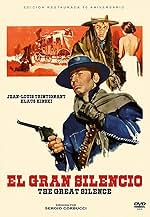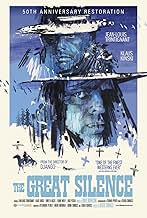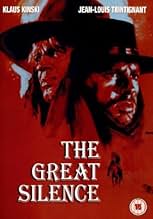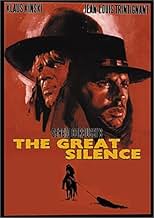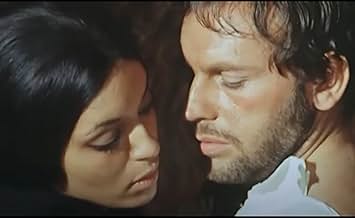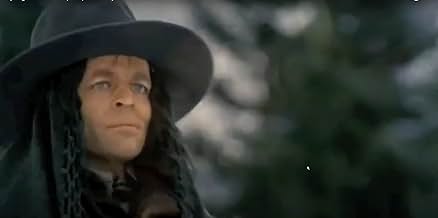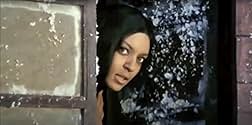AVALIAÇÃO DA IMDb
7,7/10
19 mil
SUA AVALIAÇÃO
Um pistoleiro mudo defende uma jovem viúva e um grupo de bandidos contra um bando de assassinos generosos no inverno de 1898, e segue-se uma luta tensa e sinistra.Um pistoleiro mudo defende uma jovem viúva e um grupo de bandidos contra um bando de assassinos generosos no inverno de 1898, e segue-se uma luta tensa e sinistra.Um pistoleiro mudo defende uma jovem viúva e um grupo de bandidos contra um bando de assassinos generosos no inverno de 1898, e segue-se uma luta tensa e sinistra.
- Direção
- Roteiristas
- Artistas
- Prêmios
- 1 vitória no total
Jean-Louis Trintignant
- Silenzio
- (as Jean Louis Trintignant)
Vonetta McGee
- Pauline Middleton
- (as Vonetta Mc Gee)
Carlo D'Angelo
- Governor of Utah
- (as Carlo D' Angelo)
Fortunato Arena
- Outlaw
- (não creditado)
Giulio Baraghini
- Man in Saloon
- (não creditado)
Gino Barbacane
- Poker Player
- (não creditado)
Lino Coletta
- Hunter
- (não creditado)
Avaliações em destaque
"That western in the snow" - was my brother's response when he heard that I'd finally tracked down a copy of THE GREAT SILENCE, a.k.a. THE BIG SILENCE (I first saw it 10 years ago on BBC2's 'Moviedrome').
If you like Sergio Leone's films (such as THE GOOD THE BAD AND THE UGLY and A FISTFUL OF DOLLARS) then you'll probably enjoy this film by Sergio Corbucci. Violence, shooting, cussing, strange costumes, haunting music, trademark camera angles and the Italian style go to make up one of the best (lost)westerns I've ever seen.
These films aren't to everyone's taste, but THE GREAT SILENCE is worth watching just to hear the main theme tune which is a fantastic work of latterday composition - it sounds daft but I nearly cry when I hear it sometimes. By turns the score is dream-like, stylish, menacing, bizarre and even ridiculous (twanging sitar-like sounds). This is my favourite piece of Ennio Morricone's music.
As I said before the main reference points for this film are those of Sergio Leone, except for the snow-laden setting and the distinct lack of humour( THE GOOD THE BAD AND THE UGLY still makes me laugh, despite countless watching). Having said that this film has a distinctly original atmosphere of it's own, brought out in the brilliant and shocking ending. the director went to great lengths to preserve his radical finale (particularly unpopular with the producer) - there is a version of the film with a cop-out ending.
In short then, this is a great movie despite all the shortcomings of the particular genre( I'm not saying anything)- I once read that the term "Spaghetti Western" was a derisory one used by American film critics - but I can't think of any American westerns as enjoyable as some of these Italian films.
If you like Sergio Leone's films (such as THE GOOD THE BAD AND THE UGLY and A FISTFUL OF DOLLARS) then you'll probably enjoy this film by Sergio Corbucci. Violence, shooting, cussing, strange costumes, haunting music, trademark camera angles and the Italian style go to make up one of the best (lost)westerns I've ever seen.
These films aren't to everyone's taste, but THE GREAT SILENCE is worth watching just to hear the main theme tune which is a fantastic work of latterday composition - it sounds daft but I nearly cry when I hear it sometimes. By turns the score is dream-like, stylish, menacing, bizarre and even ridiculous (twanging sitar-like sounds). This is my favourite piece of Ennio Morricone's music.
As I said before the main reference points for this film are those of Sergio Leone, except for the snow-laden setting and the distinct lack of humour( THE GOOD THE BAD AND THE UGLY still makes me laugh, despite countless watching). Having said that this film has a distinctly original atmosphere of it's own, brought out in the brilliant and shocking ending. the director went to great lengths to preserve his radical finale (particularly unpopular with the producer) - there is a version of the film with a cop-out ending.
In short then, this is a great movie despite all the shortcomings of the particular genre( I'm not saying anything)- I once read that the term "Spaghetti Western" was a derisory one used by American film critics - but I can't think of any American westerns as enjoyable as some of these Italian films.
Twenty five years before Clint Eastwood made his departure from the western genre with his violent, cynical epic "Unforgiven", Sergio Corbucci had already treated us with one of the most dark and unforgiving tales of vengeance violence and that has ever graced the western screen. A forgotten classic that deserves recognition "The Great Silence" is Corbucci's definitive movie, powerful to the point of sadness. It can and it will shock it's viewer, with it's unforgiving nature, and themes.
Set around the snowy landscapes of Utah, "The Great Silence" stars Jean-Louis Trintignant as Silence, a mute gunfighter assisting a group outlaws for and a woman trying to avenge her dead husband. They are faced against a group of bounty hunters, led by Loco (Klaus Kinsky) a ruthless and merciless man who values only the money he gains from the killing.
Corbucci utilizes the snow-filled landscape to the maximum, creating a hauntingly chilling atmosphere that sticks with you from the beginning to the end and most likely, long after you've watched the film. The opening shot demonstrates perfectly the technique employed by Corbucci, with a long shot of Silence as he rides thru the desert of snow, there are no other environmental elements, just him riding calmly forwards accompanied only by a chilling tune from Morricone. This entire moment creates a image so strong so hypnotizing that I found myself re-watching it again and again. It is these moments that make "The Great Silence" great, experiencing the silence before the gunshot and the silence after it, the moments of reckoning, the moments that decide the fates of human beings. I emphasize on "human beings" because the characters here are not only likable but believable and they very much feel like real people, the kind you might like or despise or love or hate. It's not about Silence's skills as a gunfighter, but the human aspect bellow, that is what makes him feel real. None of this would have succeed had it not been for the brilliant acting of the entire cast. Trintignant and Kinsky make the biggest impression though, adding layers of depth to their respective characters without even uttering a word, just their facial expressions, the way the move, the confidence with which they act it is simply brilliant.
Commenting on the final scene would be a downright shame to those who haven't seen the movie just yet. But it is one of the most memorable, no not only memorable it is one of the greatest endings ever shot, with one of the best uses of slow-motion I have ever seen. Slow-motion that captures the darkest, saddest moment, the one thing no one would expect to happen in a western. This further helps to strengthen the major anti-violence theme as the credits begin to roll and the viewer is left to cope with the unexpected finale.
Ennio Morricone serves one of his best scores. I would easily rank this amongst "The Good, The Bad and The Ugly" in terms of quality. But it is by no means similar to it. No. We are not soothed by the comfortable music heard in his collaborations with Leone. This score is, haunting and sad, like the movie itself it has an emotional effect on the viewer.
"The Great Silence" is as every bit as good as any of Leone's films. But is also as every bit as different from them. A uniquely dark voyage into the brutal reality of human nature, concealed as a western. Sergio Corbucci died in 1990, his movies weren't remembered by many, but those that did will never forget "The Great Silence".
Set around the snowy landscapes of Utah, "The Great Silence" stars Jean-Louis Trintignant as Silence, a mute gunfighter assisting a group outlaws for and a woman trying to avenge her dead husband. They are faced against a group of bounty hunters, led by Loco (Klaus Kinsky) a ruthless and merciless man who values only the money he gains from the killing.
Corbucci utilizes the snow-filled landscape to the maximum, creating a hauntingly chilling atmosphere that sticks with you from the beginning to the end and most likely, long after you've watched the film. The opening shot demonstrates perfectly the technique employed by Corbucci, with a long shot of Silence as he rides thru the desert of snow, there are no other environmental elements, just him riding calmly forwards accompanied only by a chilling tune from Morricone. This entire moment creates a image so strong so hypnotizing that I found myself re-watching it again and again. It is these moments that make "The Great Silence" great, experiencing the silence before the gunshot and the silence after it, the moments of reckoning, the moments that decide the fates of human beings. I emphasize on "human beings" because the characters here are not only likable but believable and they very much feel like real people, the kind you might like or despise or love or hate. It's not about Silence's skills as a gunfighter, but the human aspect bellow, that is what makes him feel real. None of this would have succeed had it not been for the brilliant acting of the entire cast. Trintignant and Kinsky make the biggest impression though, adding layers of depth to their respective characters without even uttering a word, just their facial expressions, the way the move, the confidence with which they act it is simply brilliant.
Commenting on the final scene would be a downright shame to those who haven't seen the movie just yet. But it is one of the most memorable, no not only memorable it is one of the greatest endings ever shot, with one of the best uses of slow-motion I have ever seen. Slow-motion that captures the darkest, saddest moment, the one thing no one would expect to happen in a western. This further helps to strengthen the major anti-violence theme as the credits begin to roll and the viewer is left to cope with the unexpected finale.
Ennio Morricone serves one of his best scores. I would easily rank this amongst "The Good, The Bad and The Ugly" in terms of quality. But it is by no means similar to it. No. We are not soothed by the comfortable music heard in his collaborations with Leone. This score is, haunting and sad, like the movie itself it has an emotional effect on the viewer.
"The Great Silence" is as every bit as good as any of Leone's films. But is also as every bit as different from them. A uniquely dark voyage into the brutal reality of human nature, concealed as a western. Sergio Corbucci died in 1990, his movies weren't remembered by many, but those that did will never forget "The Great Silence".
The spaghetti western is a hybrid creature in many ways. it mixes the great American legend by demystifying it with European pessimism. It plays the landscapes and its inhabitants as ambiguous vehicles of destiny and violence (the background often conveys the mood more than the characters, as the films of Corbucci and Leone demonstrate). And although Fistfull of Dollars is mean and lean, it remains a pale copy of Kuroswa's superior Yojimbo. Despite it's beautiful opera, Once upon a Time in the West is too elegant. despite its biting humor and epic scope, the Good, the Bad and the Ugly is too playful...
What we have here, is nothing less than the ultimate essence of the Spaghetti Western: irony, cruelty, tenderness, beauty, violence, larger than life characters... and chaos. the chaos is as present in the general mood as it is in Corbucci's wild and messy camera-work (from beautiful panoramas to crash zooms and close ups that accentuate the villains' ugliness).
The story is straight and simple but allows for great characters as the mute bounty hunter Silence (Trintignant, conveying impossible emotion with nothing but his haunting eyes) travels to a snowy town to bring down the killer of his client's husband and coincidentally fulfill a more personal vengeance. He is pitted against a range of pathetic and ugly villains, headed by a sleazy and psychotic Loco (Kinski, mesmerizing as the cruel but contained and playful killer).
All the while the nihilism and harshness of nature weigh over these characters as people freeze to death, a man drowns in a frozen lake and the survival of the fittest is demanded in a bloody fashion, leading to a devastating ending that seals this tight film together as a magnificently macabre opera of death. Unmissable.
What we have here, is nothing less than the ultimate essence of the Spaghetti Western: irony, cruelty, tenderness, beauty, violence, larger than life characters... and chaos. the chaos is as present in the general mood as it is in Corbucci's wild and messy camera-work (from beautiful panoramas to crash zooms and close ups that accentuate the villains' ugliness).
The story is straight and simple but allows for great characters as the mute bounty hunter Silence (Trintignant, conveying impossible emotion with nothing but his haunting eyes) travels to a snowy town to bring down the killer of his client's husband and coincidentally fulfill a more personal vengeance. He is pitted against a range of pathetic and ugly villains, headed by a sleazy and psychotic Loco (Kinski, mesmerizing as the cruel but contained and playful killer).
All the while the nihilism and harshness of nature weigh over these characters as people freeze to death, a man drowns in a frozen lake and the survival of the fittest is demanded in a bloody fashion, leading to a devastating ending that seals this tight film together as a magnificently macabre opera of death. Unmissable.
Sergio Corbucci swaps the desert for snowy mountains, howling coyotes for howling wind, and supplies a strong silent hero so silent that he doesn't speak at all. Ennio Morricone changes tone completely and gives us a morose, sad soundtrack that perfectly matches the atmosphere of desperation that flows through the entire film. No doubt about it – this film leaves a mark.
In the mountains of Utah, starving citizens of the town of Snow Hill are forced to steal to feed themselves, and in turn have to hide in the mountains with a price on their head. The corrupt banker and Justice of the Peace Pollicut (Luigi Pistilli), encourages bounty hunters to hunt them down, as he makes a percentage on every 'bandit' brought in. However, the persecuted folks have help in the form of Silence, who really, really hates bounty hunters – and with good reason. Silence will only fire upon someone if they draw first, and he also likes to shoot the thumbs off bounty hunters, as Pollicut knows too well.
Worst of all the bounty hunters is Loco (Klaus Kinski), who doesn't even care why people have a price on their heads, as long as he gets the money, and there's no 'dead or alive' where Loco is concerned. If they're dead, he doesn't have to feed them. Loco kills the husband of Pauline, who returned from exile to visit his wife, and she hires Silence to kill him. Loco knows that Silence is too fast for him, and will not be drawn into a gunfight yet.
There's also a new Sheriff in town that quickly twigs that things aren't quite right in Snow Hill. Burnett (Wolff, playing the only character approaching 'comic relief'), does not agree at all with Pollicut and Loco's tactics, even going so far as to arrest Loco and take him elsewhere for a trial.
That's enough plot! There's loads going on in this film, and plenty of it must have been quite daring for 1968. The interracial sex scene between Silence and Pauline for starters (and the music during this bit is outstanding, even for Morricone!), the bloody violence with headshots being a speciality, and the ending! The ending! Jesus! Buddha! Brian Blessed! The ending! Indy! The ending! I will not reveal it here, but it's certainly not something you encounter very often, in any genre. Jaw-dropping.
The acting is also faultless too, even if it is dubbed. Klaus Kinski is very restrained for the most part, but still comes across as a polite, malicious, sadistic murderer who is also smarter than everyone else. This might possibly be the best film I've seen him in. Luigi Pistilli isn't too far behind either. He's cowardly and scheming and likes to make others do his dirty work (mainly Mario Brega, who meets a gory end that stands out). Frank Wolff jumps between comedic and serious as the only male character in possession of a soul. His character follows the law to the letter, which may be a mistake in the hostile environment of Snow Hill. I'm not familiar with the actress that plays Pauline but she also stands out as a woman channelling her grief into one simple task – to kill Loco.
This one gets the highest recommendation for me!
In the mountains of Utah, starving citizens of the town of Snow Hill are forced to steal to feed themselves, and in turn have to hide in the mountains with a price on their head. The corrupt banker and Justice of the Peace Pollicut (Luigi Pistilli), encourages bounty hunters to hunt them down, as he makes a percentage on every 'bandit' brought in. However, the persecuted folks have help in the form of Silence, who really, really hates bounty hunters – and with good reason. Silence will only fire upon someone if they draw first, and he also likes to shoot the thumbs off bounty hunters, as Pollicut knows too well.
Worst of all the bounty hunters is Loco (Klaus Kinski), who doesn't even care why people have a price on their heads, as long as he gets the money, and there's no 'dead or alive' where Loco is concerned. If they're dead, he doesn't have to feed them. Loco kills the husband of Pauline, who returned from exile to visit his wife, and she hires Silence to kill him. Loco knows that Silence is too fast for him, and will not be drawn into a gunfight yet.
There's also a new Sheriff in town that quickly twigs that things aren't quite right in Snow Hill. Burnett (Wolff, playing the only character approaching 'comic relief'), does not agree at all with Pollicut and Loco's tactics, even going so far as to arrest Loco and take him elsewhere for a trial.
That's enough plot! There's loads going on in this film, and plenty of it must have been quite daring for 1968. The interracial sex scene between Silence and Pauline for starters (and the music during this bit is outstanding, even for Morricone!), the bloody violence with headshots being a speciality, and the ending! The ending! Jesus! Buddha! Brian Blessed! The ending! Indy! The ending! I will not reveal it here, but it's certainly not something you encounter very often, in any genre. Jaw-dropping.
The acting is also faultless too, even if it is dubbed. Klaus Kinski is very restrained for the most part, but still comes across as a polite, malicious, sadistic murderer who is also smarter than everyone else. This might possibly be the best film I've seen him in. Luigi Pistilli isn't too far behind either. He's cowardly and scheming and likes to make others do his dirty work (mainly Mario Brega, who meets a gory end that stands out). Frank Wolff jumps between comedic and serious as the only male character in possession of a soul. His character follows the law to the letter, which may be a mistake in the hostile environment of Snow Hill. I'm not familiar with the actress that plays Pauline but she also stands out as a woman channelling her grief into one simple task – to kill Loco.
This one gets the highest recommendation for me!
A voiceless vigilante enacts revenge, if you've been tricked or tripped up he can make amends, for a fee he will dispense, compensation, recompense, with the weapon of his choice (a Mauser C96), he will avenge. Loco makes collections for the state, if there's a bounty on your head he will checkmate, always dead never alive, as he conspires and connives, has the backing of the local magistrate.
The town of Snow Hill lives up to its name as Pauline Middleton, wonderfully performed by Vonetta McGee, seeks revenge for her husband's killing at the hands of Loco, a devious and scheming bounty hunter (just as wonderfully performed by Klaus Kimski), by hiring the man with no noise who goes by the name of Silent, and bears a close resemblance to a similar spaghetti western character you may have come across, played perfectly by the suave Jean-Louis Trintignant. The ending may leave you a little confounded as it takes a tangent you most likely won't be expecting or indeed be familiar with.
The town of Snow Hill lives up to its name as Pauline Middleton, wonderfully performed by Vonetta McGee, seeks revenge for her husband's killing at the hands of Loco, a devious and scheming bounty hunter (just as wonderfully performed by Klaus Kimski), by hiring the man with no noise who goes by the name of Silent, and bears a close resemblance to a similar spaghetti western character you may have come across, played perfectly by the suave Jean-Louis Trintignant. The ending may leave you a little confounded as it takes a tangent you most likely won't be expecting or indeed be familiar with.
Você sabia?
- CuriosidadesAccording to Sergio Corbucci, Marcello Mastroianni gave him the idea of a mute gunfighter when the actor told him that he had always wanted to do a Western, but unfortunately didn't speak English. When Corbucci first met Jean-Louis Trintignant, he learned that he didn't speak English either. Because he had a fascination with characters with a crippling weakness, Corbucci decided that this was the moment to turn the taciturn Spaghetti Western hero into a mute.
- Erros de gravaçãoOn the map in the governor's office, the state of Nevada is identified as Utah.
- Citações
[English subtitled version]
Pauline Middleton: Once, my husband told me of this man. He avenges our wrongs. And the bounty killers sure do tremble when he appears. They call him "Silence." Because wherever he goes, the silence of death follows.
- Versões alternativasTwo alternative endings were created for this film:
- A "happy" ending, in which Sheriff Burnett (having somehow survived being trapped under a frozen lake) rides into town and shoots Loco before he can kill Silence, allowing him to kill the remaining bounty killers. This ending was once believed to be shot for the North African and Japanese markets, but has since been revealed to have been created as an alternative solution for the producers, who wanted the film to have a "seasonal" (ie. Christmas) appeal.
- A lesser-known, "ambiguous" re-cut of the original ending with additional footage, in which Silence is wounded, but Loco gestures to his gang members to leave the saloon before they can kill anyone.
- ConexõesFeatured in Western, Italian Style (1968)
Principais escolhas
Faça login para avaliar e ver a lista de recomendações personalizadas
- How long is The Great Silence?Fornecido pela Alexa
Detalhes
- Data de lançamento
- Países de origem
- Idioma
- Também conhecido como
- El gran silencio
- Locações de filme
- Cortina d'Ampezzo, Belluno, Veneto, Itália(location scene)
- Empresas de produção
- Consulte mais créditos da empresa na IMDbPro
Bilheteria
- Faturamento bruto nos EUA e Canadá
- US$ 53.074
- Fim de semana de estreia nos EUA e Canadá
- US$ 8.755
- 1 de abr. de 2018
- Faturamento bruto mundial
- US$ 60.500
- Tempo de duração1 hora 41 minutos
Contribua para esta página
Sugerir uma alteração ou adicionar conteúdo ausente

Principal brecha
By what name was O Vingador Silencioso (1968) officially released in India in English?
Responda
